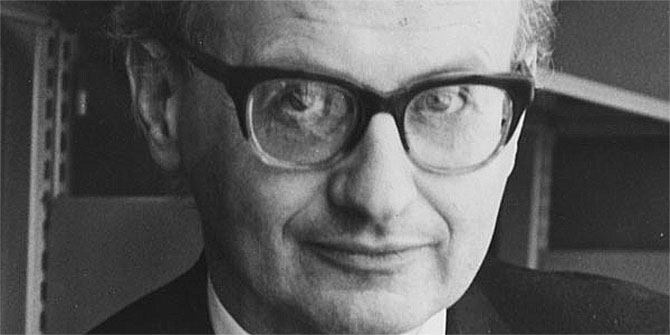Imre Lakatos was born on 9 November 1922. He is an internationally renowned philosopher of mathematics and science. He was lecturer at the Department of Philosophy, Logic and Scientific Method at LSE from 1960 until his untimely death in 1974.
He is the author of the classic work in the philosophy of mathematics Proofs and Refutations and proposed a renowned account of scientific method called The Methodology of Scientific Research Programmes.
In 1986, the Lakatos Award, which is the most prestigious international prize for contributions to the philosophy of science, was established and endowed by The Latsis Foundation.
On 2-4 November 2022, the Department of Philosophy, Logic and Scientific Method hosted a conference to celebrate the life and work of Imre Lakatos on the centenary of his birth.
Here are some personal words by John Worrall, former Professor of Philosophy at LSE, on Lakatos 100th birthday:
‘I first met Imre Lakatos in early October 1966: the start of my second year as an LSE undergraduate. I had – purely out of interest – attended Karl Popper’s lectures on “Problems of Philosophy” in my first year at LSE, was blown away by them and at the end of the year decided to switch my BSc (Econ) “Special Subject” from “Statistics” to “Philosophy, Logic & Scientific Method”. I had been assigned the fearsome Dr Lakatos as my tutor for my second and third years of study. A rather shy 19-year old working class lad from Lancashire, I approached the door of Lakatos’s office in the (now demolished) East Building with trepidation – justified trepidation as it turned out: I was brusquely told that, whatever the Regulations might say about the number of times you should see your tutor, he would absolutely refuse to see me again unless and until I had carefully read, and worked through the all the exercises in, Stoll’s Set Theory and Logic, Courant and Robbins’ What is Mathematics? and a physics text by Holton and Roller. (He also threw in Koestler’s The Sleepwalkers and Popper’s Conjectures and Refutations for “light relief”.) I think he didn’t expect to see me again – but some time shortly before the end of the first term I turned up at his office carrying my attempts at all the exercises. After a (pretty cursory) glance at my answers – I could have got away with being a lot less conscientious (!), he pronounced me a “hopeful monster” (look it up, I had to) and my reward was an offprint of the 4 articles making up his “Proofs and Refutations” and an invitation (more like an instruction, really) to attend the Popper Seminar (a 2nd year undergrad at a Staff/Student seminar – heady stuff!)
After that, I saw him often – once I had graduated, I became his Research Assistant, PhD student and, I guess, protegė. Without him, I would never have started an academic career. I am very excited at the prospect of celebrating the continuing impact of his contributions to philosophy of science and philosophy of mathematics at the Centenary Conference.’



Connect with us
Facebook
Twitter
Youtube
Flickr